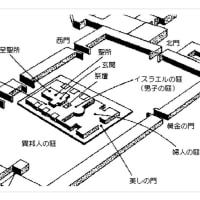24章 生き方において袂を分かて
1.生き方において袂を分かて
箴言は、様々な資料がソースとなっており、その一部は、エジプトの知恵の書、アメンエムオペの教訓からの引用であると考えられています。ことにこの24章は、そうなのです。しかし、それは、著者の意図にそって使われていると理解すべきでしょう。つまり、著者の神を恐れ、信じる立場から、指導者が持つべき考え方や、印象深い人生訓、そして日々心掛けるべき生き方の指針をまとめています。
そこでまず1節、悪い者たちを羨んではならない、彼らと行動を共にしてはならない、その生き方において一線を画せ、と勧めています。また神を恐れ、神を信じ、知恵に寄り頼もうとするなら、賢く計画し、慎重に物事を進め、勤勉であることを大事にすべきだ、と(3-4節)。また、与えられている人間関係を大事にせよ(5-6節)、というわけですね。
イスラエルでは、古い町の遺跡が発掘されている場所をいくつか見かけますが、そのような町には、共通した作りがあって、町を囲む城壁と門があります。そしてその門の内側はちょっとした広場になっていて、教育の場として利用されていました。そこで教師が、人々に呼び掛け教えを語るのです(8:1-3)。5節では「知識のある人は力を増す。」と。良い教えには、よく耳を傾け、自分を向上させなさい、と言います。愚かな人間に人を教える力はありません。そして、人を見下し学ぼうとしない人は、いずれ人に疎まれるようになるのが落ちです。
10節、人の苦しみは、いつまでも続くものではありません。イスラエルの王様ダビデは、苦境に立たされた時に、主によって奮い立ったと言います(サムエル記 第一30:6)。気落ちせずに、この真っ暗なトンネルの出口も近いと、心をしっかりさせて行動することです。また、社会においては、不条理にも闇に葬り去られていく人々がいるものです。正しい者は、そこで、見て見ぬふりをしません。神様もそうだからです(11-12節)。13節で、わが子よ、蜜を食べよ。それは美味しい、と言います。蜜は、知恵のこと、つまり、神のことばの比喩です。苦難にある時にこそ、神のことばである聖書を読め、そこには望みが尽きない、と言うのでしょう(13-14節)。正しい人は七度倒れても、また起き上る(16節)。正しい人生を生きるなら、決して倒されて終わりとなることはありません。また正しい人は、他人の不幸を喜ぶことはありません。たとえ敵のような者であれ、その身に不幸があるというのは、神の裁きがあったということですし、あなたの恨みもそれで果たされた、と考えるべきだ、と言います(17-18節)。大切なのは、神、主を恐れることです。21節では、そのようにしない者とは、生き方において袂を分かつ方が良い、と言います。
2.付加的な知恵
24節以降もまた、ソロモンのオリジナルではなく、知恵ある人々の格言集をまとめたものです。統一した文脈を掴むのが難しいところです。23-26節は、正しい裁判の重要さ、27節は、家庭を持つ前にまず経済的に自立すべきことを教えています。当時は、農業が主でしたから、農地で生計を立てられるようになることがその基準でした。経済的にも精神的にも自立して結婚をするという考え方は、昔も今も変わりはありません。28-29節は、人に悪を企てない、悪をもって悪に報いない、善を行え(ローマ人への手紙12:17)という使徒パウロの思想に通じるものがあります。
最後に、怠け者の生活をしてはいけません(30-34節)。怠けた人生は、それだけ実りも少ないからです。自らの明日が築かれるような生き方をすることです。現代は、物質的には豊かな時代です。しかしその精神性は実に貧しいというべきでしょう。何事につけ、見通しも深さもありません。だからこそ悪いことと正しいことの区別も曖昧で、生活のメリハリもないのかもしれません。気付いたら何か変なことに巻き込まれていたというのではなく、日頃から聖書を読み、物事の善悪の判断をしっかりさせて、人生を歩んでいきたいところではないでしょうか。では今日もよき一日となるように祈ります。
<クイズコーナー>
最初に、昨日のクイズです。ソロモンが作った箴言は、全部で、いくつだと言われていますでしょうか?①500、②1500、③3000。答は③3000でした(1列王4:32)。では今日の聖書クイズです。箴言の10-15章で、特徴的に使われている並行法は、次のどれでしょうk?①同義型並行法、②反意型並行法、③合成型並行法。答えはまた明日。では今日もよき一日となりますように祈ります。
Chapter 24: Embittered in the Way We Live
1. embittered in the way of life
Proverbs draws from a variety of sources, some of which are believed to be taken from the lessons of Amenem-Opeh, the Egyptian book of wisdom. This is especially true of this chapter 24. However, it should be understood that it is used according to the author's intention. That is, from the author's position of fearing and believing in God, he summarizes the ideas that leaders should have, impressive life lessons, and guidelines for how we should live our lives that we should keep in mind every day.
In verse 1, the author encourages us not to envy the wicked, not to act in concert with them, and to draw a line in the sand in the way we live our lives. If we fear God, trust in Him, and lean on His wisdom, we should plan wisely, do things carefully, and be diligent (vv. 3-4). You should also cherish the relationships you have been given (vv. 5-6).
In Israel, you can find several places where ruins of old towns have been excavated, and such towns have a common structure: a wall and a gate surrounding the town. And inside the gate was a little square, which was used as a place for education. There, teachers would call out to the people and teach them (8:1-3), and verse 5 says, "He who has knowledge will increase in power." (8:1-3). He tells them to listen carefully to good teaching and to improve themselves. A foolish man has no power to teach others. And those who look down on others and refuse to learn will eventually be shunned by others.
Verse 10, Human suffering does not last forever. David, king of Israel, said that he was roused by the Lord when he was in distress (1 Samuel 30:6). We should not be discouraged, but act with a firm heart that the exit from this dark tunnel is near. Also, in society, there are those who are absurdly buried in darkness. The righteous will not turn a blind eye. In verse 13, he says, "My son, eat honey. It is delicious, he says. Honey is a metaphor for wisdom, the Word of God. He would say, "In times of distress, read the Bible, the Word of God, in which there is no end to hope" (vv. 13-14). The righteous man may fall seven times, but he will rise again (v. 16). If you live a righteous life, you will never end up being knocked down. The righteous person does not rejoice in the misfortune of others. He says that even if someone is like an enemy, the fact that he is unhappy means that God has judged him, and you should consider your resentment fulfilled (vv. 17-18). In verse 21, he says that it is better to part company with those who do not do so in their way of life.
2. additional wisdom
Verses 24 and following are again not original to Solomon, but are a compilation of sayings by wise men. Verses 23-26 teach the importance of a righteous trial, and verse 27 teaches that one should first become financially independent before starting a family. At that time, agriculture was the mainstay of life, so the standard was to be able to earn a living from farmland. The idea of being financially and spiritually independent in marriage was and still is the same, and verses 28-29 echo the Apostle Paul's thought of not plotting evil against others, not repaying evil with evil, but doing good (Romans 12:17).
Finally, do not live a life of idleness (vv. 30-34). For a lazy life is so much less fruitful. We are to live in such a way that we can build our own tomorrow. Today, we live in an age of material abundance. However, our spirituality is very poor. There is neither perspective nor depth in anything. Perhaps that is why the distinction between what is wrong and what is right is blurred, and there is no sense of balance in our lives. We should read the Bible on a regular basis and make a firm judgment of right and wrong in our lives, rather than getting caught up in some strange situation. I pray that today will be another good day for you.
<Quiz Corner
First, yesterday's quiz. How many proverbs are said to have been written by Solomon? The answer is (1) 500, (2) 1,500, and (3) 3,000 (1 Kings 4:32). Here is today's Bible quiz. Which of the following parallelisms is used characteristically in Proverbs 10-15: (1) synonymous parallelism, (2) antitype parallelism, and (3) synthetic parallelism? The answer will be given tomorrow. I wish you a good day.

















